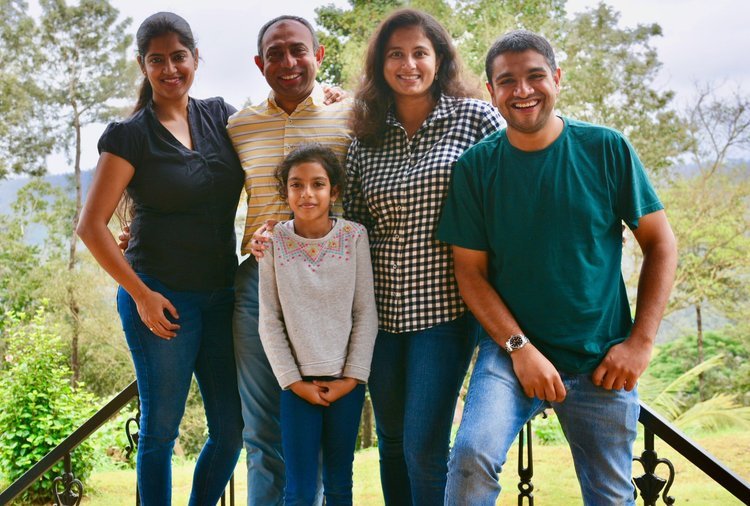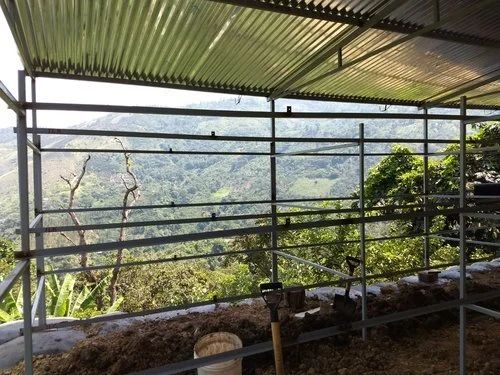your personal coffee passport
Your coffee: Peru Churupampa, India Venkids and Uganda Zombo
india
FARM: Venkids Valley Estate
LOCATION: Kandankolli Village Karnataka, Coorg, India
CULTIVARS: Coffea canephora (robusta): congensis and old peredinia
EXPORTER: South India Coffee Company
IMPORTER: This Side Up Coffees
ROASTER: Special Roast
peru
FARMS: Finca Churupampa SAC
LOCATION: Chirinos, San Ignácio - Cajamarca, Peru
CULTIVARS: Typica, Caturra and Pache
EXPORTER: Churupampa has own export license
IMPORTER: This Side Up Coffees
ROASTER: Special Roast
Uganda
FARMS: farmer owned farms and microstations
LOCATION: Ovuru Village, Paidha, Zombo District, Uganda
CULTIVARS: Predominantly SL 14.
EXPORTER: Zombo Coffee Partners Ltd.
IMPORTER: This Side Up Coffees
ROASTER: Special Roast
About the indian farm
Venkids Valley Estate is run by husband and wife Pavan and Shilpa Nanjappa who started their coffee journey in 2013 when they inherited Pavan’s late father’s estate. Their first harvest was a mere 480 kilos but they approached coffee growing in a fresh way. They grow both arabica and robusta varieties, meticulously block planted with single varietals. It was their robusta that especially caught our attention: at various official cuppings at SCA events, not one jury member could not determine that they were tasting a robusta, confusing the Nanjappa’s coffee with a monsooned arabica. The Venkids Valley farm is home to over 40 varieties of jungle trees, where the coffee is shade grown. Spices such as pepper and cardamom, and fruits including oranges and avocados are also grown. Between 50 - 60 varieties of resident and migratory birds and the scattering of wild bees balances the eco - system. The region boasts of fertile soil, diverse vegetation and balanced climate.
About the peruvian farm
Churupampa is not just a farm, it's a social business model which the Tocto family aims to expand, the last years to 30 neighbouring farms in their town of Chirinos. Some of the upgrades include better processing facilities, plant renovation schemes with the introduction of new varieties, new drying techniques with plastic covered raised beds to secure stable and uniform drying despite seasonal rainfalls. In 2018, the quality control team cupped around 4,000 samples. Not one lot goes uncupped! This coffee is also Organic and Fair Trade Certified.
About the Ugandan farms
Zombo operates unlike any other value chain we work in. Not only do the farmers own the microstations themselves (not indirectly through a cooperative) but Zombo as an exporting entity is aiming to be 25% farmer-owned by 2028. Andy Carlton, one of the founders, is somewhat of a development guru it turns out. He introduced microstations or micromills to many parts of Africa (including to CPNCK in Congo: Ngula is one of his creations) after Indonesian example - these are small, affordable mills that are operated not by large coops or single farmers, but by villages of up to 200 people. As such, Zombo is a hybrid of a private company, farmer cooperative, milling station, NGO and exporter - what a model!
Blending three coffees - the specs
what to taste for
Aroma: dark chocolate, dried berries, herbs, spices.
Body: round mouthfeel with a thick body.
Acidity: hint of citrus, grape.
Aftertaste: white pepper, almond, honey.
PROCESSING your coffee
The Indian coffee is pulped the same day and fermentation is done without the use of water, afterwards the coffee is either washed to remove the mucilage and dried on patios lined with UV resistent plastic for washed coffees. The Peruvian coffee is washed and double fermented - using a hand pulper, coffees are pulped and fermented in tiled tanks for about 12-24 hrs depending on weather. They are then washed and fermented again for the same amount of time. The Ugandan coffee is fully-washed. The red-ripe cherry coffee is harvested by the farmer and brought to the microstation the same day. It is inspected and if necessary hand-sorted for defects, then immersed in water to remove floaters. It is then weighed and a buying note is issued to the farmer, along with cash payment. The cherry is pulped on the same day as it was delivered.
ROASTING YOUR COFFEE
Special Roast uses a 22kg Probat UG22 roaster, that has been built in 1965. The roast time is 11 minutes. After the first crack, the coffee is roasted for a remainder of 25% of the time. To obtain the best flavor and taste each coffee or blend has a unique roast profile.
Relative PRICE BREAKDOWn*
57%
is what the farmers get of the green coffee price in Rotterdam. This is for growing, harvest, milling and preparing the bags for export.
14%
Exporting by Capricornio in Brazil, Zombo Coffee Partners in Uganda and Ontosoroh Coffee in Indonesia.
8%
total shipping costs to Rotterdam. Full container loads good forwarding connections warrant such favourable shipping prices.
21%
Importing, financing, shipping bureaucracy, sampling and financing costs for This Side Up Coffees.
*these numbers are averages of the three coffees taken together
Copyright on pictures. Please consult This Side Up Coffees if one desires to use the pictures for commercial and non-commercial purposes.
Background of this coffee in the Netherlands
Peru
When we came across Churupampa through former This Side Upper Sara's network, we saw the smallholder development model that we are promoting worldwide, but fast-forwarded several years. The Tocto family's achievement is a national example of how entrepreneurship, respect for local farming traditions, circular thinking and direct roaster relations can completely change rural livelihoods. Since 2011, the coffee farming community in the town Chirinos has done away with the subsistence coffee farming mentality and steadily created a strong, quality focused brand: their innovative processing and independent quality control lab ensure that they can create beautiful coffees that are sought after yearly by the specialty market - up to now mainly in the US.
In 2017 This Side Up connected to Churupampa, and we immediately knew we wanted to welcome this group of farmers into our "family" and help them continue their path of quality innovation and expansion to more people in the region. As a first import, we sought to identify lots that represent the breadth that this origin can offer. The Churupampa lot is surprisingly fruity for a Peru with notes of apricot, orange, sugar and custard, whereas the Cordillera Nadina is deep sweet with notes of molasses, sugar cane, lime and cocoa nibs.
India
Indian coffee has been on our wish list for a very long time because of an incredible mix of properties not found anywhere else: pure forest systems, advanced processing knowledge, a passion for developing not only specialty arabica but robusta as well - combined with integrity, ethics and extreme business efficiency. You find yourself wondering how this country is not top of mind for every coffee roaster out there.
We got to know Pavan and Sjilpa through Komal of the South India Coffee Company, and the first year all communcation went through them. What we loved to see however, was that Komal actively encouraged me to talk and work directly with Pavan, after which we started talking on Whatsapp and Instagram. In a competitive market like India, it was great to see not only the value all our partners place in open communication between everyone in the chain, but also that Venkids’ owners, the Nanjappa family, has great respect for SICC. With a vision and mission like this, the match with This Side Up couldn’t be better.
Uganda
Uganda is already well-known for excellent robusta coffee. In recent years Uganda has begun to build a second reputation, as an origin of fine arabica coffees. Fertile land, volcanic soils, plentiful rainfall and sunshine, good varietals, diverse pockets of suitable micro-climates and altitudes, all combine with improved production practices to contribute to this emerging origin of really tasty specialty coffees.
The Zombo region, the Alur Highlands, is for most coffee people a blind spot on the map. It is located on the western banks of the Nile, the river that leaves Lake Albert and starts its long, meandering journey to the Mediterranean. On this hilly plateau, the Alur people speak a Nilotic language which is not related to the majority Bantu languages of sub-Saharan Africa. They have strong cross-border family relationships in DR Congo, next door.
Zombo Coffee Partners is pioneering an innovative business model, a unique African hybrid that combines a private shareholder company with a group of smallholder cooperatives by offering the coops shares in the company. Zombo works in close partnership with the coops, helping their members to add value by improving quality, and sharing profits with them when we sell their coffee, all with a mindset and focus of full price transparency and open book keeping. Next to all this, Zombo has a strong focus on helping the farmers to break free of the C-price trap for coffee as a commodity, a mission that lies very close to the heart of This Side Up.
Zombo works with a concept called coffee microstations. The coffee microstation is an African farmer-owned business and processing model which produces consistently high quality coffee at a very small scale. It is a miniature central coffee washing station that is within the means of a small group of farmers to construct and manage, with a minimum of external support. Its purpose is for smallholders by their investments and their work to increase the quality, consistency and selling price of their coffee, and thereby maximise their income and participate meaningfully in the coffee value chain. The following ones work with us:
Ajere is a breakaway group from a registered cooperative society which had not traded its members’ coffee for some years. In 2017-18 the members worked with Zombo’s development partner, Agency for Community Empowerment (AFCE), to construct a new microstation within the boundary of Zombo Town, but not inside the town. The specialist equipment and materials for this project came from Oxfam Uganda, matched by farmer contributions of land, time, skills, local materials and cash.
Culamuk arose out of a project funded in 2015 by Oxfam Uganda and implemented by Twin UK. Its members built a microstation in 2 months and produced a small volume of high-scoring coffee which was sold to Atlas Coffee Importers in Seattle, along with that of the other two 2015 microstations, Leda and Pamitu.
Gonyobendo was formed by Nile Highland Arabica Coffee Farmers Association and was given a pulper by USAID. It worked for a number of seasons supplying a multinational exporter. In 2018 the group began working with Zombo.
Ndhew is a registered cooperative society. In 2017-18 the members worked with our development partner, Agency for Community Empowerment (AFCE), to construct a new microstation within the boundary of Zombo Town. The specialist equipment and materials for this project came from Irish Aid through Oxfam, matched by farmer contributions of land, time, skills, local materials and cash.


































